#elisabetha cronqvist
Text
You guys want to know a fun flower fact ?
Lilies represent pure love, the nobility of feelings, but also marital union.
After the death of someone, they are used to represent the purification of their soul before they reach heaven.
So now that we established that... What about we take a look at two lovely pics ? <3
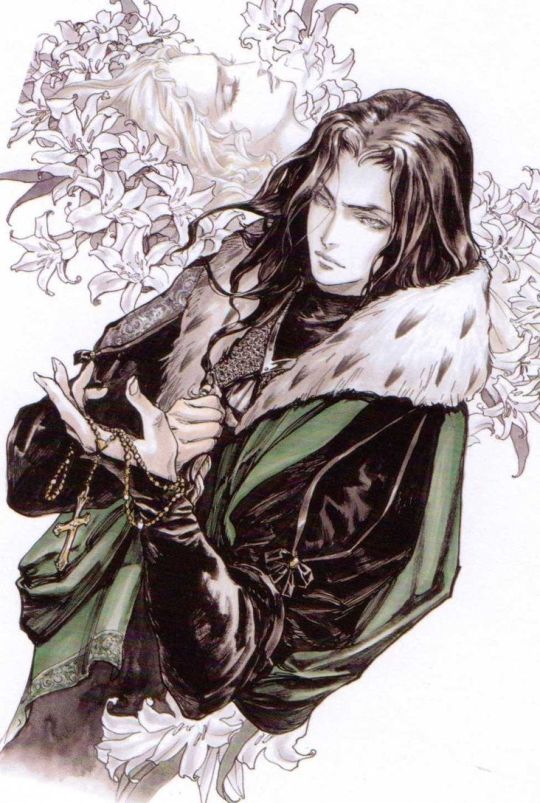
First is Mathias Cronqvist and the corpse of Elisabetha, covered with lilies.
Second is...

Dracula from CoD.
It's interesting to see that Mathias has a few lilies of his own. If Elisabetha's probably represent all of what i mentioned above, Mathias' lilies might only represent his feelings for her, how deeply he cared, his union with her. But it's interesting to interpret them as some sort of "mockery" of the "purification of the soul before reaching heaven" part, knowing how that man ends up. <3 Dead ? Yes (kinda). Pure ? No. Heaven ? LOL. LMAO. <3
His lilies are also clean. Just normal, pure white flowers...
Now if we look at Dracula's lily, not only is there only one, but... it's bloodied. And while Mathias' lilies were "attached" to him, Dracula is actually holding his... by the tip of it's rod. As if he could let go at any moment, as if it would slip from his hand from the slightest wrong movement. It's a very delicate situation. And the representation of his current state of mine.
This man is broken. He loved Lisa so deeply he regained his humanity back while with her, but everything shattered when she died. If the lily represents his love for Lisa and what was left of his humanity, things part of him is still hanging onto... you can be sure it fell off his hand the moment Trevor killed him.
Grief and rage took place in his heart, turning a love that was pure into something unholy. Into an obsession, a fuel for his madness. And while he lost the flower, the blood remained. He's forever tainted, unable to escape his sadness and anger.
This is my interpretation, though I'm sure there can be more. Thanks for coming to my ted talk.
#those men have a lily motif and I am very grateful for it <3#castlevania#castlevania analysis#vlad dracula tepes#mathias cronqvist#lament of innocence#curse of darkness#wish there was an artwork of Dracula and Lisa + lilies. just like Mathias had with Elisabetha :<#i checked. there is no lilies in sight in the 'dracula holds lisa's dead body' artwork. :(#a shame.#elisabetha cronqvist#lisa tepes#local bastard#i love them so fucking much. GAH.
139 notes
·
View notes
Text
Is said that Elisabetha died from an illness but my biggest questioning is: "What was the illness?"
Acording to search from internet that I found the most common diseases in Middle Ages were dysentery, malaria, diphtheria, flu, typhoid, smallpox and leprosy. And we all know that the hygiene was limited in that time period.
Whatever was the case, the average life expectancy at birth was around 30 years in that time period, rare case if they where people live over the 40's (since Rinaldo himself in his late 40's).
#castlevania#akumajou dracula#elisabetha cronqvist#like i'm serious that this point#what illness did she had#i have an headcanon is that she didn't died from illness but she was poisoned by her rivals#but i give up this messed up idea#but that is what i think#an the medicine wasn't advanced as is now#but gojo's quote from jujutsu kaisen that “love is the most twisted curse”#fits so well with mathias' lose after elisabetha died#and yes i add a jujutsu kaisen reference
13 notes
·
View notes
Text

Елізабет описують, як жінку приголомшливої краси з витонченими рисами обличчя. Лізу, як красиву жінку з ніжними рисами обличчя. В мене хед, що в Лізи більші чіткі лінії, Елізабет - м'які(дякую артам Аямі Кодзіма).
#castlevania#lisa tepes#elisabetha cronqvist#lament of innocence#castlevania netflix#castlevania fanart#my art
62 notes
·
View notes
Text
Until I Found You
Here’s the cropped version of my video: https://www.tumblr.com/ignix191/695819251997605888/this-is-the-first-time-ive-made-an-edit-i-hope?source=share

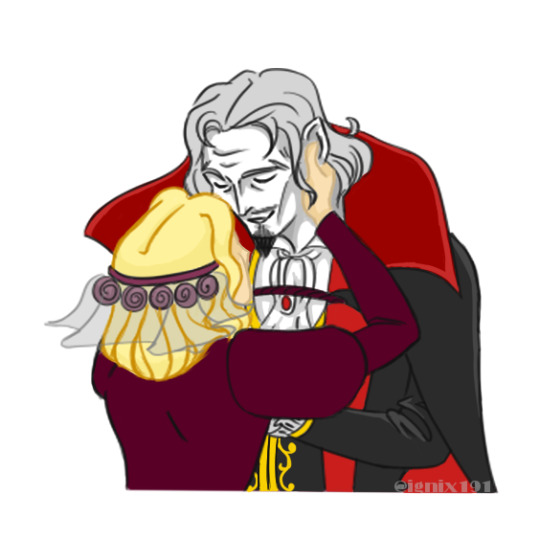

#Castlevania#castlevania fanart#castlevania artists#lament of innocence#symphony of the night#aria of sorrow#dawn of sorrow#mathias cronqvist#elisabetha cronqvist#vlad dracula țepeș#lisa tepes#soma cruz#mina hakuba#until i found you
140 notes
·
View notes
Text


[ID: Image 1 is Elisabetha Cronqvist from Castlevania, coloured in varying browns. The outline is slightly sketched and messy. Her back is to the viewer, and she looks to be mid spin, her left arm mostly hidden by her dress. Her right arm is holding up the right hand side of her skirt, revealing her ankles and shoes, the latter dark brown in colour. Her hair is loose, with a slight flow to her right, and a light grey-brown colour. Her dress is plain, with puffed shoulders, a darker grey-brown hemline on the sleeve near her wrist and lower part of the dress and a slightly low back. A watermark (WJB) is scribbled near right hand part of the dress. Image 2 is near identical, however a white outline of halo is added above her head, and a white outline of two feathered wings are added from her shoulder blade area, which droop slightly towards the ground. End Description.]
I apologise if the image ID is a load of rubbish, I am abysmal at describing images.
A bit of very, very, very slight Elisabetha angst for the soul? Why not.
10 notes
·
View notes
Text
Friendly reminder that Elisabetha is soft and Mathias likes her.




I wonder how posting this through the app shall fuck me over.
On another note, if it takes Mathias loving his wife because she is soft to be comfortable posting shitpost art, then so be it.
#wjb art#shitpost#art#lament of innocence#mathias cronqvist#leon belmont#mywife is soft nd ilikeher#this really made me think of Mathias#he loves Elisabetha#meme drawing#I really need to stop drawing these two in memes.
12 notes
·
View notes
Text
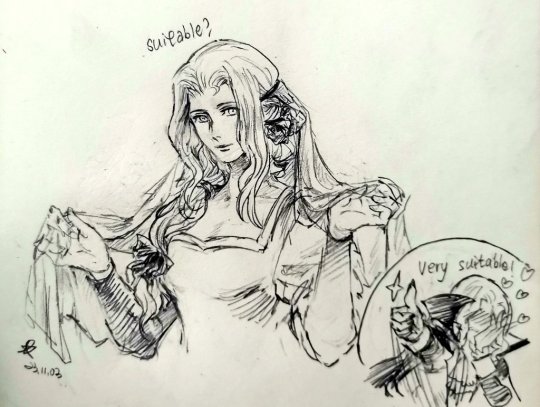
You can imagine this happened before painting for Lisa.(there's a portrait painting of Lisa in comic)She's showing her new look to dracula:3
(I was thinking of drawing Elisabetha Cronqvist,too.)
180 notes
·
View notes
Text
Dracula in Netflixvania: how small changes in lore build up to disaster
Changes in adaptations are bound to happen. Cuts in the lore are bound to happen. But I find incredible how so many tiny changes in the lore of Castlevania brought by NFCV, apparently innocuous or even improvements according to some, actually lead to the narrative completely falling apart both as an adaptation and as its own story.
Let's start with the biggest change:
Lament of Innocence didn't happen.
Everything has been covered in this clear thread. To summarize what this change affects:
Dracula in the games started out as Mathias Cronqvist, a man who, wracked by grief for the loss of his wife Elisabetha, rebelled against God and concocted a plan to turn into a vampire and have Death as his loyal servant. In the show, he's just "the oldest vampire", with no clearer origins. (in the games Dracula wasn't even the oldest vampire, Walter and Joachim already existed, but they don't matter for this list)
Leon Belmont in LoI was a crusader who had to throw away his title to rescue Sara, his fiancée. He was involved in Mathias' selfish plan, that lead to Sara's death, and cursed him to be hunted by his descendants for the rest of time: what makes it more painful is that the two used to be best friends. In the show, Leon was already a vampire hunter while fighting in crusades, and only moved from France to Wallachia to hunt Dracula, whom he had no previous relationship with.
The Vampire Killer in the games is the strongest holy weapon against dark creatures, due to it being infused with Sara's soul. There are other whips in the setting, but none can match the Vampire Killer. In the show, it's just a regular consecrated whip, and Trevor also fights with the Morning Star (turned from a powered up version of the VK to a different object) and Leon's longsword (the Belmonts in the games never use swords).
But these can be forgiven as small changes in adaptation, one could say. Elisabetha was cut because, really, she was a non-entity. Sara was cut because the VK can work just fine without her. Leon doesn't need to be Mathias' bestie, the Belmonts can fight Dracula out of the goodness of their heart.
All valid arguments. But this is just the beginning.
Dracula hunted humans before Lisa showed up.
We don't know in detail what Dracula was up to between LoI and CV3. For all intents and purposes, he focused on honing his new vampire powers, moved to Wallachia, made himself a nice castle, and... chilled there. Perhaps he became the voivode of the land, the historical Vlad Țepeș.
It's heavily implied, though, that he had zero beef with humanity, and in fact he was willing to help certain people as long as they were against God, Dracula's one enemy at the time.
Hector and Isaac are, of course, the proof of this.
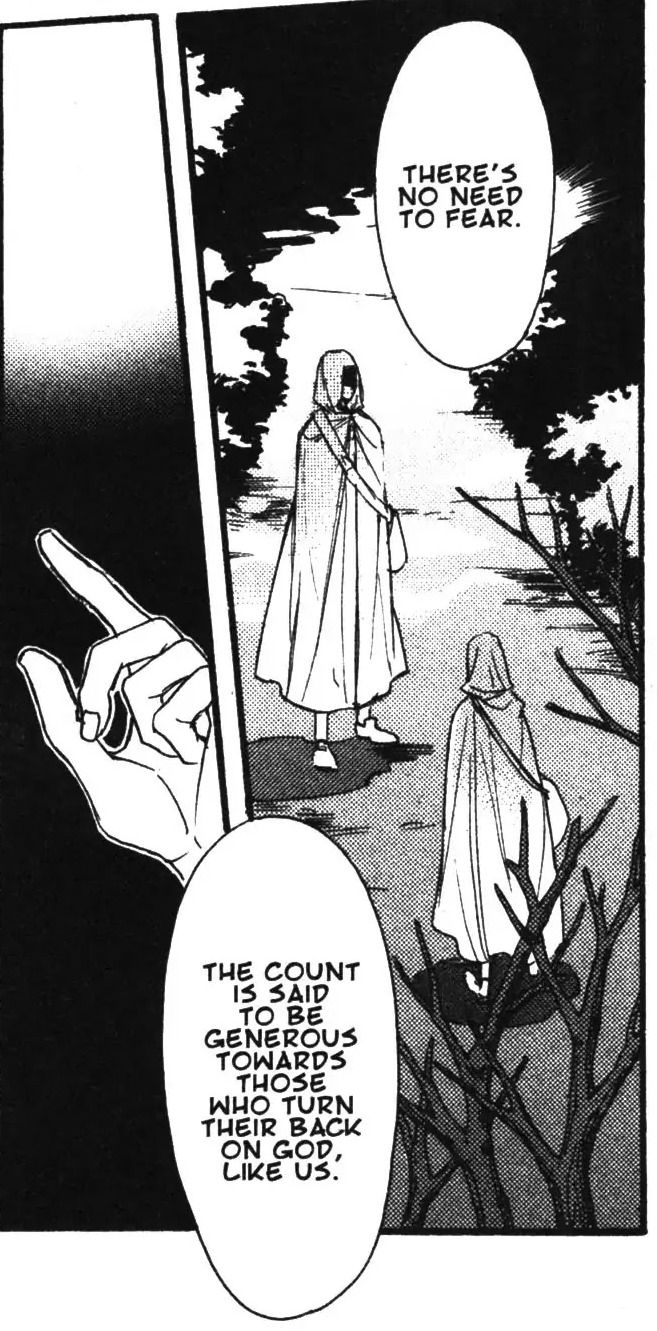
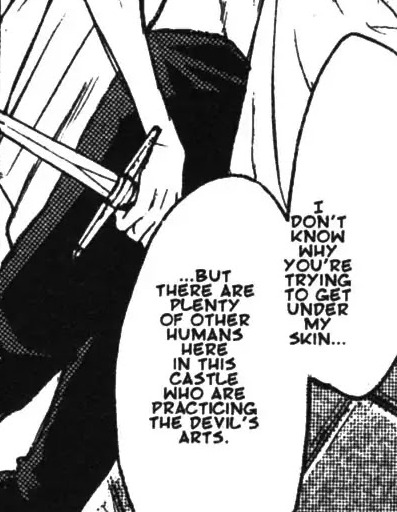
But even without the extra material, they were two humans who were welcomed in his court and served under him, in an extremely important role to boot.
(to be fair, the show gives an alternative and decent explanation for the Forgemasters' presence as humans in Dracula's court: the fact that they're willing to kill their own kind proves to him how trustworthy they are. A detail that was changed but on its own does not break the lore: good job!)
Alucard in GoS gives us these intriguing words:
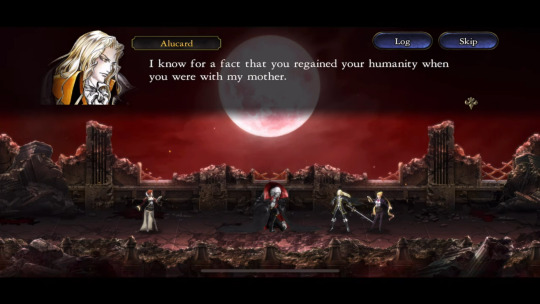
which not only emphasize how Lisa brought to light Dracula's better side, but even imply that she briefly reversed the corruption brought by vampirism. It makes more believable why such a pure-hearted woman would fall in love with him.
Instead, the show directly opens with Lisa marching through Dracula's courtyard, infested with impaled skeletons, and flirting with the guy. And if this could be justified if one imagines that those humans attacked Dracula's first, the flashback in Season 2, where he's shown having a grand old time going on a killing spree because some merchants "disrespected" him, proves that no, he was an outright monster when Lisa met him.

Due to the first season and the finale's rushed nature, it's harder to imagine why would Lisa find a kernel of humanity in this vampire. She doesn't come off too good either.
Why does it matter?: despite his grief having a more prominent role in the story, Dracula is actually less sympathetic in this version. This wouldn't be terrible, as he is meant to be a tragic yet intimidating villain, if it weren't for the fact that the show paints him as utterly pitiable, and it's even known for "giving him depth". Shankar himself sees him as the hero of his own story.
In the show, Carmilla keeps asking why didn't Dracula turn Lisa into a vampire. With game Dracula, one can believe that he valued her humanity so much that he was willing to let her die of old age eventually, as long as she died as herself. The show, instead, never gives us an answer, because the question isn't meant to paint him in a noble light, but as an idiot who doesn't know what he's doing.
Lisa is less compassionate towards humanity.
Lisa's death is very different between Symphony of the Night and show. In the latter she got burned at the stake, while in the former she was crucified and we can assume she bled to death. This affects two factors.
One, in the game, we know that Alucard stayed with his mother until her last breath, allowing her to speak her last words to her son. In the show, Lisa dies alone shouting in the hopes that Dracula hears her. The title sequence of the first episode shows Alucard kneeling in front of Lisa, but this is not shown in the actual story, and there is no further indication that he was actually there: realistically, it's not possible.
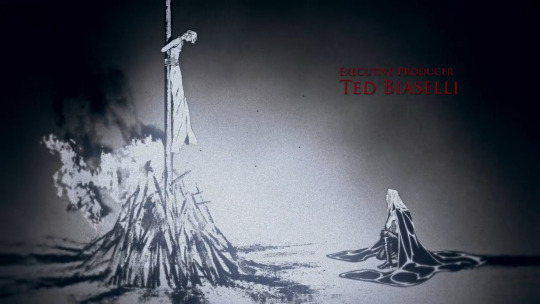
Two, her last words are also different.
SoTN (ENG): "She said "Do not hate humans. If you cannot live with them, then at least do them no harm. For their's is already a hard lot. She also said to tell you that she would love you for all of eternity…"
SoTN (JP): "Do not blame humans. She said that those unable to forgive mankind will walk the path of their own destruction. Those who do not belong to that world shouldn't do anything... And Father... she said that she will love you forever."
NFCV: "Don't hurt them! They don't understand! I know it's not your fault, but... if you can hear... they don't know what they're doing. Be better than them. Please!"
Lisa in the game holds no ill will towards humans. She urges Alucard not to resent them, and understand that their lives are already difficult. She even attempts to find a compromise for ease of his mind: if he truly can't forgive, may he at least leave them alone. In Japanese, she emphasizes that hating humans will only be detrimental, a somber foreshadowing of Dracula's downfall. And finally, she parts with a last thought to her husband, a soft declaration of love. The tragedy here is that Alucard kept Lisa's words dear to his heart, but he could not tell them to Dracula, who instead used Lisa's memory as a weapon to wage war on mankind. By the time Alucard reveals Lisa's final wish, three hundred years later, it's too late.
Lisa in the show doesn't sound the same. Not only she ignores her son completely, but her focus seems to wanting to appease Dracula, who might or might not be hearing her, it's ambiguous. She quotes Jesus speaking to God, but she sounds more like an abused wife scared of her abusive husband's rage, a sentiment echoed in S2. She also puts emphasis on how "it's not his fault", as if to absolve Dracula of the responsibility of his reaction, and that Dracula should be "better than them", implying that she thinks lowly of them and wants Dracula to be superior. Not exactly compassionate.
Why does it matter? 1: the show had a chance to flesh out Lisa and Alucard's relationship as mother and son, and it squanders it to further emphasize Lisa's already established attachment to Dracula. Not only it cheapens Alucard's attachment to the mother he fights his father for (he, bafflingly, even says "Then find the one who did the deed", which misses the entire point of his character), this becomes much worse by the time of the finale, as I describe below.
Why does it matter? 2: Lisa, once again, loses sympathy points. The inherent hypocrisy of Dracula disrespecting Lisa's memory is never breached in the show, which prefers to focus on his shortsightedness, but Lisa's wish herself is not as purehearted in the show. In fact, as I said, her relationship with Dracula sounds quite unhealthy now, which of course never gets acknowledged.
Dracula hired Hector and Isaac shortly after Lisa was killed.
There are so many changes brought to the lore of the Devil Forgemasters that they deserve their own post. Each change only causes more logical problems in the show's plot, and it makes the villain story in Season 2 fall apart.
In the prequels, both Devil Forgemasters went to knock on Dracula's door on their own volition, to study the dark arts and live in a place that would accept them. In the show, it's the other way around: after Lisa urges him to travel around the world, Dracula accidentally finds both of them, one in Rhodes and the other in the Sahara, and then he looks for them again once he needs them. This is not the most important change, though, as what matters is that Hector and Isaac are loyal to Dracula for being the only person kind to them, and in all fairness the trait is kept. What matters is how this affects Hector.
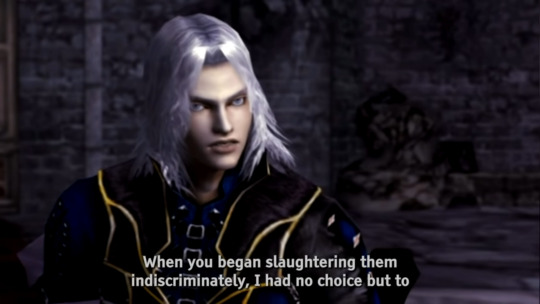
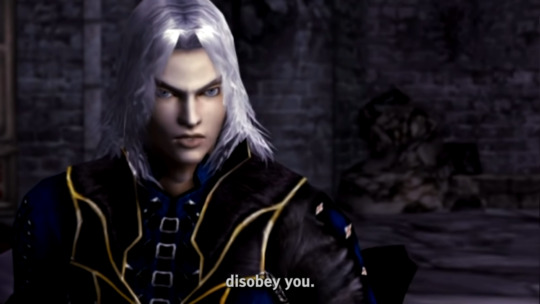
This line implies that Hector was left blindsided by Dracula's decision of exterminating mankind. This was not what he signed for! Hector never, ever wanted to harm humans, and he was so disgusted by his Lord's actions that he preferred to leave. In the show, Dracula already presents him with the idea of "stopping" humans: he means genocide, but Hector proposes that they be turned into livestock for vampires, and accepts to help him as long as there's no needless suffering.
Why does it matter? Hector started off with all the building blocks to go through a similar character arc he goes through in the CoD prequels, but he's turned into a less sympathetic character, as he was on board with turning humans into cattle from the get go. An anti-villain who'd enslave his own kind out of a misguided sense of mercy needs a carefully woven narrative to justify, and possibly redeem. We all know what happened to him.
To be fair, the story wasting Hector is not the fault of the lore changes, so there's no point in elaborating here. I will mention, however, that some fans genuinely believe Hector deserved to be enslaved and raped precisely because of his original plan, which makes the narrative even grosser.
Why does it matter? 2: Dracula lying to Hector to gain his help because "he's a child in a man's body" and thus "he's easy to lie to" devalues Hector, his intelligence (most obvious in his scenes with Lenore, where it's clear that he didn't think too deeply about Dracula's plans and she takes advantage of that weakness), and even Dracula himself who apparently doesn't trust the man enough with his real plans, but trusts him enough with the role of a General of his army... even as he's shouting in the war room that he doesn't enjoy paddling in the blood of innocents. It's never made clear why would Dracula even keep Hector around in the show when Isaac is presented as much stronger and smarter overall, while in the prequels, Dracula respected and trusted both (but favored Hector). Even worse, Season 3 confirms that Dracula did not invent the art of Devil Forging, but it's a type of highly advanced magic that nevertheless is fairly well known in certain circles - so then why did Dracula go out of his way to hire someone who didn't even fully agree with his plan, when there are other Forgemasters around who might be just as fanatical as Isaac?
(the reason might be in the stats sheets that came out with Season 2, that implied that Hector and Isaac were meant to be both physically weak, with the former slightly stronger and more powerful in "necromancing" than the latter. Clearly, something was changed during production to make Isaac the hypercompetent one and Hector the ineffectual one, but this part of the plot would have only worked if Hector was deemed absolutely vital to Dracula's plan)
Why does it matter? 3: Hector and Isaac only worked under Dracula for a year, and they're already called Generals. In the prequels, it's implied they spent years studying under him and gaining experience, both in the alchemy lab and in the battlefield, which is why they're called Generals in the first place (unlike the show version, who allegedly aren't even physical fighters). While Dracula explains that he trusts them due to being humans willing to exterminate other humans, it's questionable that Dracula would trust their qualifications so much; this is made even worse by the fact that Hector was "hired" thanks to a lie. When all three of them fall for Carmilla's plan, I struggle to sympathize with them, so I chalk this up to a worldbuilding and storyline failure.
Addendum: the show makes a frequent point, through Carmilla and Lenore and the Captain, that Dracula might have planned to kill Hector and Isaac together with all the humans: Isaac accepted this fate, Hector could be manipulated at the other vampires' leisure. It also paints Hector as even more of an idiot for not wanting a reward for his work, which gives even more leverage to Lenore. The mangas actually give a much more understandable reason for both points, tied with what above. I'm not making this an entire section because the result is the same: by changing the lore, Dracula comes off as more insane and hypocritical than he is, Hector comes off as profoundly stupid, and even Isaac's relationship with Dracula is now contradictory.
Dracula never became the Dark Lord.
When Elisabetha died. Mathias became a vampire through the Crimson Stone. When Lisa died, Dracula made a pact with Chaos/The Evil God to become the Dark Lord, the Avatar of Chaos on Earth. This makes Dracula far more than a vampire, and something closer to Satan, a truly terrifying figure. His penchant for cursing and possessing also proves this. Dracula, through his own actions, became the incarnation of evil.
Needless to say, Chaos isn't even hinted at in the show.
Why does it matter?: despite his posturing, Dracula is nothing special. He is in theory respected by other vampires for being the oldest and most knowledgeable one, but even that is not true, as the first thing Carmilla does is disrespect him in front of his whole court. His abilities also pale compare to what he can do in the games - while he showcases his iconic Hellfire, he doesn't even turn into his monster form!
Death is not Dracula's loyal confidant.
In the games, Death is a creature born from Chaos, and bound to serve the wielder of the Crimson Stone. Mathias was able to get his help to complete his transformation into a vampire, and since then, Death has stuck with the Dark Lord through thick and thin. Not only he's often responsible for Dracula's resurrection through the centuries, but he's pretty much described as the closest thing the vampire has to a confidant and friend.
No Crimson Stone = no Death. The role of confidant is taken by Isaac, strangely enough, with a Dracula being seriously concerned about their friendship (and this only highlights how differently Isaac and Hector are treated).
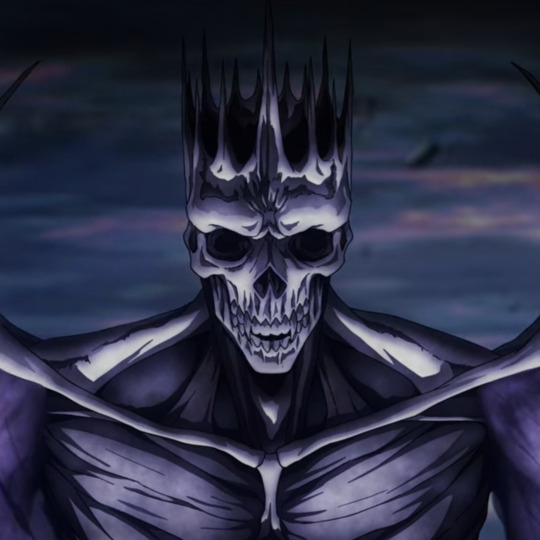
Death doesn't appear until Season 4, and he has a completely different role: he's the man behind the scenes who wants to revive Dracula, which so far is canon compliant... but he wants to use Dracula by giving him a fate worse than death, in the hopes of driving him insane and pushing him to kill as many people as possible, again. Dracula is nothing but a tool to Death, who is described as being a different type of vampiric creature.
Why does it matter?: it's yet another way Dracula is weakened and disrespected by the narrative. Constantly presenting new semi-original villains and having them insulting the main antagonist of the franchise or playing them as pawns is just tasteless.
Dracula and Lisa are brought back to life in the finale.
Death does manage to accomplish part of his plan: with St. Germain's help, he calls back Dracula's and Lisa's souls from Hell to be fused into a Rebis. After Trevor destroys Death, the two return to normal. Happy to be once again together, they decide to spend the rest of their lives together travelling around the world like they were set to do, leaving Alucard alone.
Why does it matter?: it completely shatters the whole point of the cycle of death and rebirth Dracula and the Belmonts are stuck under. Dracula in the games is brought back into the human world by mankind's evil and desires, forced by Chaos to be its avatar and a harbinger of evil. It's implied that even he grew tired of it all, which is why being reincarnated into Soma is a chance of a new start for him. By having Lisa to his side again, Dracula has no reason to hate mankind anymore. Since Chaos doesn't exist in the show, Dracula is completely free, and the year he spent planning mass extermination and suicide is quickly brushed off. We are left questioning what exactly Dracula will do now with his new life, and what he will do after Lisa's natural death.
As of Season 1 of Nocturne, he seems to have faded into obscurity: the first of the two times he is mentioned (the second time from Alucard introducing himself), it's from Juste, in a line like this:
"Whatever it is, evil. And it's everywhere. It will always be stronger than us. And you can kill this or that devil. A Lord Ruthven, a Dracula, maybe even an Olrox. But there'll always be more, more and worse."
Put in the middle as if he were a random vampire, implicitly listed as less impressive than Olrox. And to add insult to injury, Annette, who somehow knew all about Forgemasters, has no idea who he is.
In short, Castlevania, the series named after Dracula's own castle and domain, barely has Dracula as its villain, and in the short screentime he had he was blatantly disrespected.
But he's far from being the only one.
The Belmonts are incredibly nerfed.
To recap. The Belmonts are a generic clan of vampire hunters, for which Dracula is just another vampire. The two have no connection. The Vampire Killer is nowhere near as impressive as its game counterpart, regardless of the flashy animation of the fight. During the fight with Dracula, not even the Morning Star could scratch him. Dracula recognizes Trevor as a Belmont because he attempts to punch him in the face, to no avail. It's implied that, before Trevor, his ancestors went to fight Dracula. And failed. Possibly died.
The Belmonts... don't come off as being particularly heroic.
And this leads to the biggest sin: Trevor couldn't kill Dracula.
I repeat: Trevor Belmont was not the one who killed Dracula. And a weaker version to boot. He dies because he has an emotional breakdown at the sight of Alucard's childhood room, realizing too late that he's "killing his boy", and it's "his boy" who stakes him through the heart.
So much for him being the Legendary Belmont in the games, right?
Why does it matter?: The narrative feels somewhat disdainful of the protagonists of the whole franchise, let alone its own.
Alucard being Dracula's effective killer is the result of Season 2 focusing mostly on their strained father/son relationship, which has its place to be sure, but it's as if the writers copypasted the emotional climax of Symphony of the Night in what is supposed to be an adaptation of Dracula's Curse.
Generally speaking, Trevor gets the shaft in his own story. He did kill Death, the final villain of the show, but Death hardly matters in the grand scheme of things compared to Dracula. The narrative's focus was spread through too many plotlines, and clearly favored Alucard and Isaac (and Hector's plotline, but not for him). Trevor and Sypha, stuck to playing hero in random villages in Season 3 and 4, are by far the most wasted protagonists of the bunch.
The writers seem to have grown bored with the main protagonist, because other characters became more popular. It's amateurish, and once again, disrespectful to the source material: yes, not all games have a Belmont as the protagonist and sometimes they use some flimsy excuses to push them to the sides, but at least they accomplish stuff.
And this leads to...
Richter in Nocturne has lost the entire point of himself.

Richter Belmont is famous for being the turning point in the Belmont clan. While, chronologically, Juste already grappled with his own fate, Richter is the one who completely falls apart because of his legacy. For 300 years, his ancestors were born, raised and died knowing that some of them will have to destroy Dracula. Richter wrapped his identity around being a Belmont, and being tasked with killing Dracula, which he did eagerly... so when he did, he suddenly realized he had nothing to live for. He wanted to keep fighting for eternity, to give a purpose to himself. And that's how Shaft got to him. And Richter was so distraught for the shame he has brought upon the name of his clan, that he gave the VK to the Morris clan, who kept it until 1999.
Nothing of this could be kept in Nocturne, because no Belmont has ever killed Dracula, and there is no reason to even kill him anymore after he stopped hating mankind. Richter is still proud of his heritage, but he describes it as a generic "killing vampires": as of Season 1 of Nocturne, the main source of pain for him is the death of his mother at the hands of Olrox, a very different and IMO much more cliché tragic backstory.
Why does it matter?: between this, Trevor being a glorified prop, and Juste being reduced to a depressed cynical mentor, plus the OC Julia getting killed in an uncerimonious way to fuel Richter's angst, there is a sad pattern of the show almost resenting the Belmont clan as a whole. What is the point of adapting Richter's story, if his story simply cannot happen?
Richter thought Alucard was just a myth.
In SoTN, Richter immediately recognizes Alucard as the one who helped his ancestor Trevor. The implication is that the knowledge of Trevor's feats had been passed down, and survived for 300 years. Apparently, no such thing happened in Nocturne.
Why does it matter?: since Trevor did absolutely nothing of importance in the show, Richter's knowledge of his own clan lore is cheapened. This affects once again his supposed arc, confirmed by Sam Deats, of living up to his family legacy - what legacy?
And still they aren't the only ones affected!
Alucard doesn't hate his vampiric heritage.
In the games, Alucard's biggest internal struggle is about his dual nature. Both a vampire and a human, son of his father who wants to destroy mankind and son of his mother who asked him to cause no harm to them. The turmoil is so great that Alucard chooses to seal himself in a coffin twice over, in 1476 and in 1797: he explicitly does so because he feels tremendous guilt over having killed his father, and to protect the world from his "cursed" blood, as there is the chance that, if he dies, he will become a full-fledged vampire.
Absolutely nothing of this is kept in the show. Alucard reluctantly kills Dracula and is shown weeping about it, but he's fiercely, and weirdly, protective of vampires. This is shown in S2, where the reason he spends the entire time insulting Trevor and his lineage with cruel, callous and frankly xenophobic remarks is that they kept "a museum dedicated to the extermination of my people".
Furthermore, he never goes to sleep. The entirety of his story in S3 is caused by him going insane for the isolation over a month because Trevor and Sypha decided to travel alone, while Alucard guarded the castle and the Belmont Hold; in Nocturne, Alucard mentions that he spent the last 300 years slaying vampires (I suppose he changed his mind in the meantime).
Why does it matter? At its core, this is the show's attempt to make the vampires look more sympathetic, painting them as a noble race who don't deserve to be systematically killed (accidentally drawing unfortunate parallels with real life ethnicities). By default, it paints the Belmonts as morally grey, at best, hunters who kill innocent creatures like "children" and gruesomely display the remains.
Incidentally, while the objective was to make the vampires look more pitiable, the real consequence is that Alucard looks like a grand bastard, hating Trevor for doing his job and siding with bloodsucking monsters for reasons that are not elaborated upon. You'd think this would effect his relationship with Dracula, but it never comes up.
(Nocturne also comes off as even more disconnected to the original series now, as it reverts back to the notion that vampires are nothing more than shallow monsters to be killed without remorse)
Why does it matter? 2: a smaller consequence of Alucard never sealing himself in his coffin is that Trevor and Sypha come off as very insensitive friends for abandoning him right when he needed the most support. In Dracula's Curse, he choose to separate himself from them. This cheapens their supposed friendship even more.
But as for Alucard being awake for 300 years, we don't know enough to say how this has affected him. We'll see in S2.
And there you have it. Richter can't be Richter and Nocturne has to revolve around the French Revolution, because Lament of Innocence didn't happen in the show. And because the writers did not understand the source material and all the decisions that had been taken.
119 notes
·
View notes
Text






Images pulled from the wiki regarding the lost Lament of Innocence comic featuring what is allegedly Leon Belmont, Sara Trantoul, Mathias Cronqvist, Elisabetha Cronqvist, Rinaldo Gandolfi, and Liza. Proper translation and conformation regarding the text would be greatly beneficial.
8 notes
·
View notes
Text
Mathias wondering what to do after Elisabetha died

49 notes
·
View notes
Text

Elisabetha Cronqvist
#castlevania#akumajou dracula#elisabetha cronqvist#thats a possible aesthetic#but i need help with this ideas#if someome has a different aesthetic#you can give me some ideas#because i won't go mad and that helps me a lot to find inspiration
18 notes
·
View notes
Text

I thought of Leon Belmont and Mathias Cronqvist and wondered what languages they might have known.
Love poems to Sara and Elisabetha would have been inked in Old French.
12 notes
·
View notes
Text
This is the first time I've made an edit. I hope you guys like it!
#castlevania#castlevania artists#castlevania fanart#aria of sorrow#dawn of sorrow#lament of innocence#mathias cronqvist#elisabetha cronqvist#lisa tepes#vlad dracula tepes#soma cruz#mina hakuba
27 notes
·
View notes
Text
I had a dream I was sent back in time to around the time Mathias Cronqvist was courting Elisabetha and I was all "great, I just need to tag along, befriend that dude and in some years, get chomped, become a vampire thanks to this sucker and scamper away with my new found powers" but my evil plan didn't work because the dude really, really liked me? And that somehow ended with Sara, Leon, Mathias and Elisabetha living in the same place rather than them going to the crusades, they getting a happy ending as rural nobles and no vampires and they were all thankful because I made their lives so much better BUT I DIDN'T GET TO BE A VAMPIRE? MY DREAMS SUCK. So then, rather than being happy with the four of them I said man this sucks and went back to my time.
#personal#also mathias was probably the prettiest person I've ever seen like painfully pretty#what a weird dream
5 notes
·
View notes
Note
I saw your recent response to a question, dear. And I have a question of my own: Who is this "Elisabetha?" I ask not out of jealousy, but curiosity..I don't believe you ever mentioned her whilst we've been together. I sought you out originally for your knowledge, and knowledge about you, is knowledge nonetheless. Wouldn't you agree?

"You are right, I did never mention her to you. She was a part of my past I'd left behind me a long time ago.... But she is a part of my story nonetheless. And I apologize for not telling you about her sooner, my love.
In the 1100's, back when I was still Mathias Cronqvist, I was married to a woman named Elisabetha. She was my first wife, and I loved her dearly. But she was taken from me too soon by a wretched illness. I was too far away to save her, and only learned of her passing when I returned. I never even got to say goodbye. Her death led me to a downwards spiral, which resulted in me forsaking God and acquiring the Crimson stone. Her death is what led to me becoming Dracula. And I do still miss her... I never got closure for her death. But she was kind and caring and I know she wouldn't have wanted me to suffer for as long as I had. And then you took my pain away, and taught me how to love again. You opened my darkened heart back up to the world. You remind me of her sometimes, my beloved Lisa."
#dracula fanart#dracula#ask dracula#vlad dracula tepes#castlevania dracula#ask blog#castlevania#castlevania roleplay
8 notes
·
View notes
Text
These are gonna be paradoxical and unpopular opinions but I don't want Dracula to return in this new series and if he does I don't want him to function the same way he does in the games.
In Castlevania he is literally the best anti villain I have ever seen, he's a literal monster but he's one of the most human characters in the entire series. He's an intelligent, charismatic force of nature yet he's loyal, thoughtful and loving to his late wife. His humanity is not only his biggest virtue but the very thing that results in his downfall. He doesn't care about killing people, he doesn't even want to hurt Alucard but he has to do something because he can't live with the crushing weight of losing the love of his life over something so trivial and unfair. And even then he gives up everything once it really sinks in how much he's hurting his son, the last remnant of the person he loved more than anything.
But the Dracula of the game series isn't the Dracula I love. He's Mathias, an intelligent man who chose power, revenge and immortality over the chance of being with Elisabetha again. Then he remarries to Lisa (who I personally believe is the single most important character in the Castlevania series due to her communicating the theme of humanity being flawed and uneducated but inherently good). Yet once he returns to life he kidnaps a woman that reminds him of his wife and he wants to turn her into a vampire??? Not only is that a violation of boundaries but the lack of attention on Elisabetha in general and the weird lack of respect Dracula has for Annette makes him unsympathetic. He's not the monster who learned to love humanity only for it to be ripped away, he's a human who has forsaken his humanity. He doesn't even get to be the man who eventually put the crushing weight of his grief aside for the sake of his son because he keeps being implemented as the villain every time. I don't want the show's version of Dracula to stagnate as a character, coming back over and over, trying to fill whatever hole Elisabetha and Lisa left in his heart. It's not what he was made for. I don't want the straightforward villain of the game, in spite of the virtues this game series has. Dracula Tepes/Mathias Cronqvist of the games is iconic for different reasons than Dracula Vlad Tepes of the show and it should stay that way.
22 notes
·
View notes